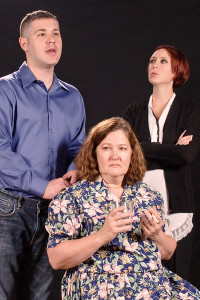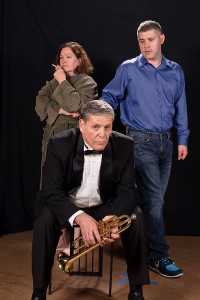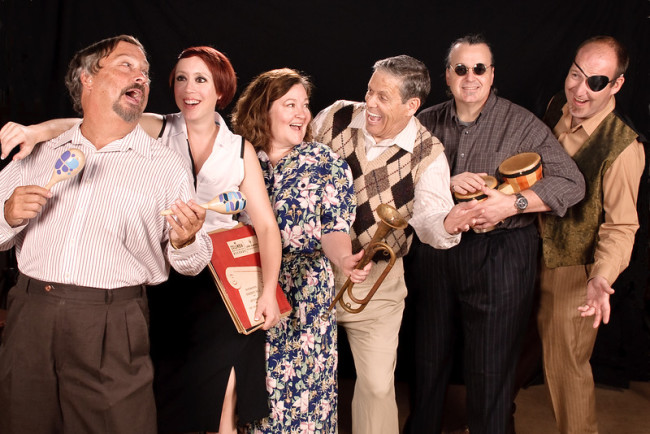Sideman: noun – a member of a band or orchestra and especially of a jazz or swing orchestra who is not the leader or a featured soloist.
Side Man written by Warren Leight is a memory play currently in production at The Colonial Players of Annapolis. This memory play is nicely Directed by Jim Reiter and features outstanding performances by Jason Vellon, Mary MacLeod, Ali Vellon, Timothy Sayles, Richard Koster, Rick Estberg, and Ben Carr. The story is told by Clifford Glimmer, the only son of Gene and follows the course of Gene’s career and family from the 1950’s through 1985 in a fluid, non-linear time line that at moments can be hard to figure out and at other times easy to follow. The show highlights Gene as a “sideman” not only in his career, where he outlives and survives the downfall of the big band era, but also in his home life, where he does not see what he is doing to his wife and child and the destructiveness of his pursuits in music.

Director Jim Reiter does a fine job of creating and developing characters that are memorable and believable. His work with actor’s Jason Vellon, Mary MacLeod, and Timothy Sayles is truly outstanding enabling each of them to shine in just the right ways to show the struggles of Gene, Terry, and Clifford Glimmer respectively. While Richard Koster, Rick Estberg, and Ben Carr round out the members of the orchestra in a perfect way with Timothy Sayles, the four are truly reminiscent of the big band era. Theater-in-the-round is always a tough for a venue and with a few exceptions Reiter does an exceptional job in allowing the audience to see and understand the story from a blocking standpoint.
Two significant flaws in blocking are the booth where actors sit when they are in the club and many of the moments where Terry Glimmer (Mary MacLeod) is in the apartment. The moments where the men are gathered on the booth are longer moments without movement and the people sitting in the section of the house behind the booth see a significant amount of the back sides of the heads of the actors. The same goes for the apartment scenes, from where I was sitting I got to see more of the back of Terry’s head than I did the front when she was interacting in the apartment. Reiter creatively blocks Clifford Glimmer (Jason Vellon) for his monologues and enables him to move throughout the space to interact with and tell the story to the whole audience.
The cast does a marvelous job, staying true to the characters in the moments of the show. This is a truly talented cast that were a thrill to watch. Outstanding moments come from each of the three main characters, Gene, Terry, and Clifford Glimmer. Timothy Sayles portrayal of Gene Glimmer is emotionally moving, powerful, and poignant. Sayles is able to show how oblivious he is to the effects his musical aspirations have on his wife and child, yet in very touching moments he is able to make you feel for him and the struggles he has trying to balance a passion and job he loves with a family he cares for and wants to support. Sayles’ performance is a tear-jerker through and through.

Mary MacLeod’s performance as Terry Glimmer is astounding. MacLeod is able to show the naiveté of a young woman coming to New York for the first time and moments later the anger and bitterness of a woman whose hopes and dreams have been dashed and heart broken by a man whom she loved yet was unable to connect with her. Jason Vellon’s performance as Clifford Glimmer is one not to forget. The movement through the story is accomplished by Vellon and his ability to tell the tale. He is able to work magic by transforming time and location with simple explanations and subtle body language; for example during a moment when he is remembering being a 10-year-old boy he uses his fingers and pockets to show the angst and nervousness created by the situation.
Patsy, portrayed by Ali Vellon does a good job of playing the waitress/groupie/wife of many of the band members, showing support for each of the members, Clifford, and Terry throughout the show. Finally Al, Ziggy, and Jonesy, played by Richard Koster, Rick Estberg, and Ben Carr respectfully, all help to show the struggles of musicians in a time when big band is ending and the future of their careers and friendships are up in the air. Each of their issues push Gene to pursue his career (or lack thereof) harder and further separates him from his wife and child.

The Set Design by Carol Youmans divided the space nicely establishing two well defined playing areas: the club and the apartment. The set and floor painting was elegantly done and helped to continue the definition of the spaces. The Costume Design by Fran Marchand and Paige Myers was era appropriate with well-established changes for the men depending on time period and what gig or action was taking place. Properties Designer Charlotte Robinson did a good job with both the musical instruments and the many different props, ensuring that they were also period appropriate. Props that were brought out throughout the performance as items being added to the apartment were, however, bothersome in the first act. Lights and a fan that had cords on them had the cords wrapped around the bases and when set down the cords were not undone. The rug that was placed on the floor was placed upside down, intentional or not, becoming a distraction to the point of making me ask the question “why?” Finally items that were brought out during intermission and added to the apartment setting but were never used ended up blocking audience members from seeing action on the couch. While Robinson’s props and scenic decoration created a nice aesthetic, it seemed that the show would have been better served with a touch of “less is more” in this design element.
Though technically the Sound Design by Sarah Wade and Jim Reiter was well done, the Lighting Design by Eric Lund could have been improved upon. One of the most difficult lighting moments in the show was during Vellon’s movement from location to location. Lund uses focused lights to highlight Vellon when he is speaking on stage, but when he moves many times he moves into the dark or almost into the narrow window of light created by the new lights, missing moments and marks and creating moments where Vellon is telling this amazing story in the dark. Another issue I had as an audience member was the harsh black lights used at the beginning of both Acts that seemed directed at the audience for some odd reason, though I do not know if that is a choice of the Theater or the Lighting Designer, it was not pleasant on this reviewers eyes.

Those minor technical issues aside, do not miss this production of Side Man. The Colonial Players of Annapolis have done a great job of telling a story that needs to be told and not forgotten, of a time and a generation of people that are leaving us too fast, and of struggles that even in today’s modern society are relatable. We still have these problems and many of us are and will always be a “Side Man.”
Running Time: 1 hour and 50 minutes with one intermission
Side Man plays through October 31, 2015 at The Colonial Players of Annapolis— 108 East Street in historic Annapolis, MD. For tickets call the box office at (410) 268-7373 or purchase them online.

